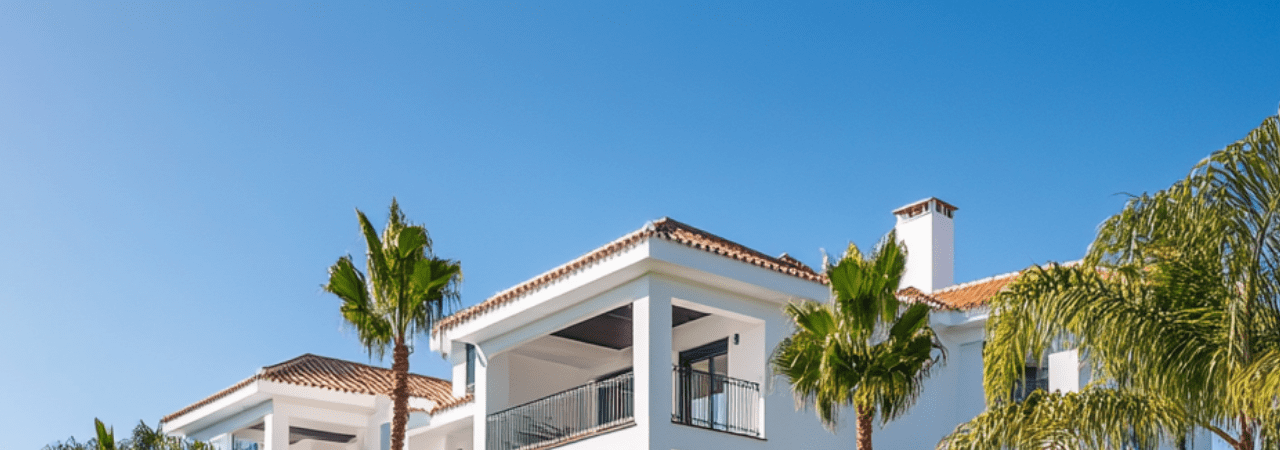Buying a house in Spain
Once you’ve decided to buy a home in Spain, an exciting journey begins — full of choices, opportunities, and a few important steps. For many international buyers, the process can feel a little unclear at first.
At Casas Palmeras, we guide you through every stage of buying your dream property in Spain — from selecting the right area to completing your purchase with confidence. Whether you’re interested in a new-build home or a resale property on the Costa Blanca, Costa Cálida, Costa Valencia, or Costa del Sol, our experienced team is here to help you every step of the way.
In this article, you’ll find 10 essential tips for buying safely in Spain and discover why working with an English-speaking real estate agent can save you both time and stress.
Location is key when buying a property in Spain. Factors such as access to main roads, public transport, local amenities, job opportunities, the climate and proximity to the sea can greatly influence a property’s value.
Whether you prefer the energy of a coastal town or the peace of the countryside, choose an area where you can truly feel at home and enjoy your ideal lifestyle.
To buy a property in Spain, you’ll need an NIE number – a personal identification number for foreigners. It’s required for all legal and financial transactions, such as buying a home or opening a Spanish bank account. You can apply for an NIE at the Spanish consulate in your home country or at a local police station in Spain. Make sure to book your appointment well in advance, as the process can take several weeks.
Pro tip: Many buyers choose to let their agent or legal representative handle the paperwork to save time and ensure everything runs smoothly.
Before starting your property search, determine how much you can comfortably spend. It’s a good idea to arrange your Spanish mortgage or financing in advance — it will give you a clearer picture of your budget and strengthen your position as a buyer. Be aware of additional costs, such as transfer tax, notary fees, and legal expenses. These costs are often higher in Spain than in other European countries.
Pro tip: Most Spanish banks offer mortgages covering 60–70% of the property price for non-residents. A local mortgage advisor can help you explore the best options.
Working with an independent lawyer specialized in Spanish property law is essential to protect your interests when buying a home in Spain. Make sure your lawyer is not affiliated with the seller or estate agent. They will review all ownership documents, check for any debts or legal issues, assist in drafting contracts, and alert you to potential risks before you sign anything.
Pro tip: A good local lawyer experienced with international buyers can also assist with practical matters such as obtaining your NIE number or setting up a Spanish bank account.
Make sure that all property details are accurate. In Spain, property information is recorded in two different registers: the Land Registry (Registro de la Propiedad) and the Cadastre (Catastro).
These two databases don’t always match perfectly — differences in plot size, boundaries, or built area are common. An independent lawyer or legal advisor can help you review these documents, identify inconsistencies, and guide you in resolving them.
Pro tip: Addressing discrepancies early prevents legal or tax issues later, especially when selling or renovating your property.
Always confirm that the person selling the property is the legal owner. In Spain, it’s not uncommon for properties to have multiple owners (for example, in cases of inheritance or shared ownership), and all of them must agree to the sale.
If the property belongs to a homeowners’ association (comunidad de propietarios), make sure to check its financial status. This helps avoid taking on unpaid community fees or debts from the previous owner.
Pro tip: Your lawyer can verify ownership details through the Registro de la Propiedad and ensure there are no mortgages or liens affecting the property.
Many properties in Spain have been (partly) built or extended without proper permits. Always verify that valid licenses exist for any extensions such as pools, terraces, or verandas.
An independent lawyer or architect can review the documentation and confirm whether the property is fully legal. If needed, your lawyer can also assist in regularising unlicensed constructions, for example through the AFO (Asimilado Fuera de Ordenación) procedure used in Andalusia.
Pro tip: Properties without valid permits can face issues when selling or renovating later on — having this checked early will save you time and stress.
It’s essential to ensure that the property is free of mortgages, debts, or legal claims. In Spain, these liabilities can transfer to the new owner if not properly verified before purchase.
An independent lawyer can request a nota simple from the Registro de la Propiedad to confirm that the property is legally clear and free from encumbrances. This step helps you avoid unpleasant surprises and protects your investment.
Pro tip: Always review the nota simple carefully — it provides up-to-date ownership details and lists all mortgages or charges registered on the property.
If the property is rented out, as the new owner you are legally required to honour any existing rental agreement. Always request a copy of current leases from the seller.
You should also make sure there are no illegal occupants (known as “okupas”) living in the property, as removing them in Spain can be both time-consuming and expensive.
Pro tip: A local lawyer can verify through official records whether any tenancy agreements or legal disputes are in place.
Make sure the property comes with the correct legal and occupancy certificates.
For new homes, this includes the Licencia de Primera Ocupación (first occupancy license), and for existing homes, the Cédula de Habitabilidad (certificate of habitability). These documents confirm that the property meets Spain’s safety and habitability standards.
An Energy Performance Certificate (Certificado de Eficiencia Energética) is also mandatory in Spain, showing how energy-efficient the property is — and it’s required for any sale, rental, or transfer.
Pro tip: Ask your lawyer or estate agent to verify the original paperwork to ensure everything is valid before signing the purchase deed.
Contact us









